| Srl | Item |
| 1 |
ID:
093698
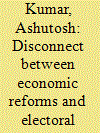

|
|
|
|
|
| Publication |
2009.
|
| Summary/Abstract |
Indian democracy is being globally acclaimed for its 'twin successes', namely achieving an impressive market reforms-driven economic growth in recent years notwithstanding ongoing global recession, accompanied with a consistent practice of democracy. Against the grain of such celebration of the 'widening' and 'deepening' of democracy in India under the shadow of globalization, the article argues that even though competitive politics is being understood as an essential 'democratic minimum' that cannot be dispensed with at the same time the concurrent depoliticization of policy process also ensures that it need not intervene in the substantive issue of economic policy. The article makes this point by visiting India's electoral politics since the initiation of neo-liberal economic reforms and taking note of the marked disconnect between the two.
|
|
|
|
|
|
|
|
|
|
|
|
|
|
|
|
| 2 |
ID:
119547
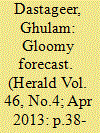

|
|
|
| 3 |
ID:
093898
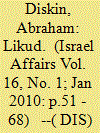

|
|
|
|
|
| Publication |
2010.
|
| Summary/Abstract |
In 1957 Downs claimed that most voters tend to hold centrist views. Hence, political parties should adopt centrist stands in order to attract as many voters as possible. Another aspect of the 'political centre' derives from prominent theories on coalition formation: the political party that captures the 'median' position in the parliament enjoys a tremendous advantage. The battle over the control of 'the centre' played a major role in the strategy of Likud in the 2009 Knesset elections, and in its ability to form a coalition following the elections. Although Kadima won one more seat than Likud, it lost the battle on the centre. Netanyahu, loyal to his centrist tendencies during the campaign, preferred to have only a segment of Labour in his coalition, at the cost of five ministerial posts, rather than to enjoy the support of the radical National Union at the cost of a single ministerial post.
|
|
|
|
|
|
|
|
|
|
|
|
|
|
|
|
| 4 |
ID:
139627
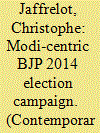

|
|
|
|
|
| Summary/Abstract |
The 2014 election campaign of the BJP was unprecedented not only because, for the first time, a Chief Minister was the prime ministerial candidate of one of the national parties in the fray and tried to promote his state achievements in terms of development across the nation, but also because the party relied on the personality of its leader more than any other party since the Congress under Indira Gandhi. Narendra Modi broke with the BJP's collegial tradition in several ways. He marginalised party veterans, short circuited the BJP apparatus to use a parallel support structure, and resorted to new techniques of communication that saturated the public space. However, these innovations were superimposed on older themes which had sometimes not been used by the BJP itself before, but by others – like caste politics or corruption. Modi's BJP also fell back on some alliances with other parties, the old RSS network, and revisited Hindutva politics to such an extent that ‘development' was definitely not the only theme of the Modi campaign.
|
|
|
|
|
|
|
|
|
|
|
|
|
|
|
|
| 5 |
ID:
154072
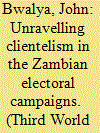

|
|
|
|
|
| Summary/Abstract |
Based on reports on selected parliamentary by-elections from 2009 to 2015 and two presidential elections in 2011 and 2015 in Zambia, this paper examines the political rhetoric to determine the presence and nature of clientelism in Zambian electoral campaigns. Zambia’s three leading newspapers, The Post, Times of Zambia and Zambia Daily Mail, were searched for reports of electoral campaigns. In total, 605 issues of each of the three newspapers spanning a period of 20 months were used. The paper concludes that a blend of vote buying and turnout buying were more evident in the campaign rhetoric in parliamentary by-elections than the presidential elections. Further, the ruling parties extended their clientelistic rhetoric to include perverse accountability.
|
|
|
|
|
|
|
|
|
|
|
|
|
|
|
|